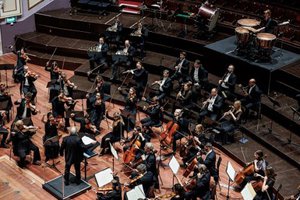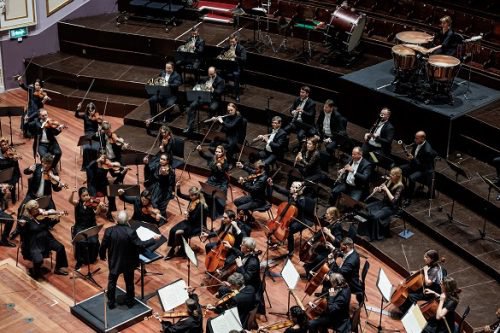This ensemble of virtuosi from Budapest earned many plaudits last year during their UK debut tour, including an excellent concert here in Edinburgh, and offered an opportunity to make comparisons with their compatriots of the Budapest Festival Orchestra, who were here last month. In last year’s concert, they performed Bartók’s Concerto for Orchestra and showed they are an orchestra of the highest musical standards. On this afternoon, they brought another piece by their countryman in Bartók’s Third Piano Concerto – one of the twentieth-century’s concerto masterpieces.- review by Gregor Tassie (Seen-and- Heard International)

Rather than opening their Usher Hall concert with the traditional overture, András Keller started with Mozart’s late Symphony No.40. The orchestra was chamber size – and except for the cello and double bass players – all the musicians were standing. One heard a clear projection of Mozart’s genial score from the supple strings (led by Zsófia Környei) and the charming woodwind – one could see from the smiles on the faces of Keller’s musicians how much they enjoy this music. There was crisp intonation from the strings in the lyrical, contrapuntal opening, enhanced by a beautiful solo from the flute of Orsolya Kaczander. In the Menuetto, the playing was fiery, set at a fast tempo to the charmingly accented Allegretto-Trio. Keller maintained the brisk pace into the celebratory Finale. Allegro assai. This very musical performance was like a breath of fresh air – immaculately performed by the Hungarians in a speedy time of just twenty-four minutes!
Joined by the French pianist Pierre-Laurent Aimard, the orchestra revealed how they can combine the classicism of the opening work with the modernism of their compatriot Bartók. In the opening Allegretto, shared with the gentle thumps from Böglárka Fabry on the timpani, a different world opened up with the sharp rhythmic profile of the first theme by the soloist announced in powerful octaves and accompanied by the secondary woodwind ideas. Heard against the harmony of the strings (now led by Miranda Liu, the associate leader of the violins) fascinating keyboard playing allowed a mixture of emotions ranging from intimacy to wild excitement immaculately accompanied by the orchestra. The devastatingly crushing theme was overwhelmingly dramatic under Keller’s direction.
In the Adagio religioso, all the harmonic beauty of Bartók’s folk-inspired ideas emerged on the magnificent strings, and again, the flute of Kaczander and Bálint Horváth’s oboe were masterly, while the thrilling changing of tempos gave the piece extra excitement heard against the exchanges on the keyboard. The upbeat themes from the piano opened the chorale-like idea in the Allegro vivace finale, with the enticing dancing rhythms in the interchange between major and minor keys all played with exotic charm and marvellous brass playing leading to the celebratory close. Aimard, in response to the audience’s rapturous applause played an encore by Hungary’s greatest living composer György Kurtág in memory of his teacher Ligeti in this centenary year – A Ligatura for Ligeti.

